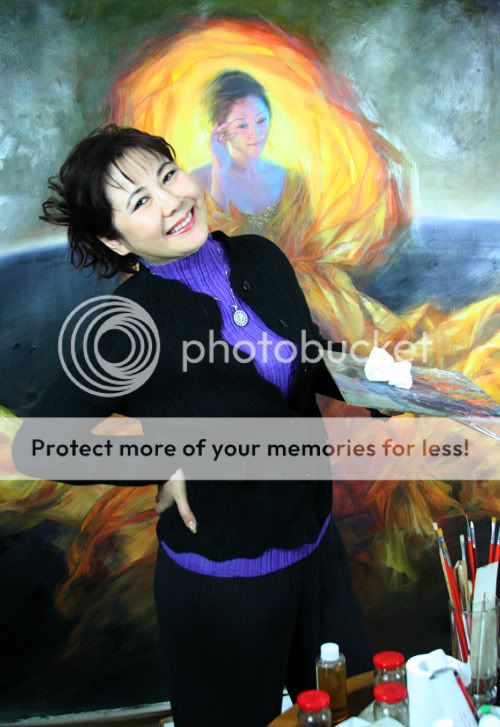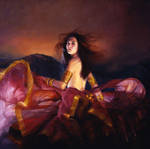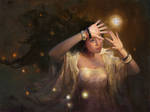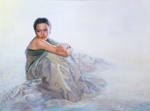ShopDreamUp AI ArtDreamUp
Deviation Actions
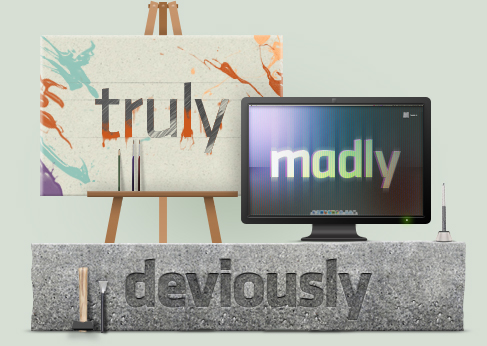
I fell in love with Jia Lu's paintings the moment I saw them. She has a way of visually delineating the cadence between body and soul that's perhaps more comprehensive than even the most exquisitely written philosophies. What strikes me the most is how gracefully and thoroughly she achieves balance in her art, whether it's with the interplay of light and darkness, the relationship between the internal and the external, or that breathless state of stillness amidst movement. Such harmony is just incredible to behold-- it's as if she is aware of a truth that most people in the world will never fully comprehend. To be honest, I sometimes feel like her paintings might be the closest I'll come to understanding what true peace is.
– zenatz19, December 26, 2010
Can you tell us a little about how you came to join deviantART? What circumstances led to your finding the site to begin with?
I confess to being almost computer illiterate, so I rely on my husband to show me the work of artists he thinks I would like. I remember seeing the dolls of Marina-B on deviantART years ago, but we really paid attention to a National Geographic article that mapped social network communities and mentioned deviantART as the tenth largest in the world. I can't find the reference now, but the idea of participating in a community of tens of millions of artists seemed to nicely balance working solo in the studio.
Your paintings often marry a celebration of human sensuality with a sense of spiritual awakening, and your classical but spontaneous technique and love for color perfectly complement that; can you tell me about your relationship to your own art, and how it may have served to liberate you?
I have an unusual relationship with my art, for I became a painter out of necessity. I won child custody after a difficult divorce; being a single mother prevented me from working as a designer on international projects, so I turned to teaching and painting at home as a way to stay with my son. In some sense I feel I have been limited by the need to work as a painter because I've always longed to put real motion and depth into my work, to see it come alive on stage or in film, accompanied by music and narrative and vivid characters. That may be why I love to light my subjects so dramatically, and prefer dancers as models. Since 2003 I have been adapting my work as a stage musical and have co-produced a show with AEG Live, the producers of Michael Jackson's last tour and Celine Dion's Las Vegas show.
I dream every night; rich, vivid dreams and sometimes terrifying nightmares filled with bizarre imagery that don't fit on the flat canvas. I have to admit that painting hasn't liberated me; perhaps I'm still looking for the right medium to express myself.
How does spirituality influence your work as an artist?
I grew up in a materialist, atheist society. We were taught that religion is an opiate and until I was an adult I never had the chance to visit a church or a temple except as a cultural artifact. I travelled to the Mogao Caves at Dunhuang in 1980 to study the art there and sensed, though I did not understand, the power of Buddhas and bodhisattvas painted on the cave walls. But I have always sensed there is a world around us we cannot see, and a power that protects and inspires us. In the 1990s I had the chance to return to Dunhuang and to work with many spiritual men and women while creating a 700 square meter Buddhist mural in Japan. Since then I have been fortunate to learn more about Chinese and Tibetan Buddhism, Zen, Taoism, Chinese astrology and medicine, and have compared these to what I experienced of Christianity in the West. I am an idealist, and the ideal world, the spiritual world, is more vivid and beautiful than real life. I am not very interested in the real world; it is often an unhappy place full of compromises and problems, flawed and cloudy compared to the brilliance I see in my soul. My spirit is enlarged and calmed by this unseen world. When I am working well I sometimes feel I am no more than a channel through which a higher power is speaking, allowing me to connect with other spiritual individuals and communicate with my audience's sense of the sublime.
You moved from China to Canada in the early 1980s; can you tell me about some of your earliest impressions of the west? Did this period have a marked effect on your art, or is it impossible to say?
My first impression of the West was how colorful it is! China is a gray country; all the colors are muted with black ink on white paper, slate tiles on gray brick walls, black hair and dark eyes. Intellectual discussions are literary and abstract, formal and couched in symbols. When I arrived in Canada I discovered that even a single family might have members with differently colored hair and eyes. Fashion and advertising was a riot of hues. Even the air seemed to be filled with color. Westerners spoke in specific, concrete terms; painting was illusionistic and solid; intentions were definite and clear. I still feel these fundamental differences between Asian and Western culture can be found in our art, religion, legal systems, social mores, cuisines and language. I've now spent exactly half my life in China and half in the West, and so it's natural my art, as well as my personality, has absorbed these things. I hope it has allowed my work to transcend national culture and race. I no longer belong to China or the West, and spend much time thinking about my place in the universe of seen and invisible worlds instead.
Many of us on deviantART regard you as one of our heroes, and a great source of inspiration; who are your own artistic heroes, and what have you learned from them?
I don't believe in heroes, or rather, I don't believe we should worship or imitate heroes because this will limit our own natural development. I analyze the work of other artists to find out what makes them tick and how I can use these discoveries in my own work. From Frida Kahlo if learned the importance of self-expression and honesty; from Caravaggio, theatricality and dramatic lighting; from John Singer Sargent, the beauty of brushwork, technique and spontaneity. But I also learn much from successful illustration, film and photography; even dance and music inspires me. While there are more and less talented artists, I don't believe there is anything magical about talent. All artists, however accomplished, are still only human beings like you and me, and there is nothing preventing us from doing what they do except the power of our own will and imagination. I am my own hero, so I work hard to improve myself every day.
Do you have the opportunity to travel these days? Do you have a favorite museum in the world? If so, can you share with me some of your own impressions of that museum, and what effect the art there had on you?
I would travel more if I could, because some of my greatest discoveries have been made in museums. The Louvre is where I discovered the power of oil painting. I first visited it in 1995 and returned in 1999. I remember spending four or five entire days there, arriving as the doors open and being waved out by security guards when the museum closed. It is one of the most magnificent collections in the world, and you can get up close to many paintings and see how the images are constructed, stroke by stroke, element by element. I was most deeply impressed by the power and beauty of the human figure in Greek and Roman sculpture and Renaissance and Neoclassical painting; it changed my art forever.
What advice would you give to a beginning artist, just starting out on their own journey?
I've already mentioned many things for those on the painterly path in my deviantART journal series, "Learning to See," but I think it boils down to working hard, trying everything, being observant, thinking about what you see and finally, knowing yourself. Hard work is the fate of the artist. You cannot improve unless you work and you will never be good enough. My father is still striving to be a better artist at the age of 80. I have never even heard of a "retired artist." A young artist must try as many different media as she can put her hand to: not only drawing and painting, sculpture and printmaking, but also photography and animation, poetry and music. You will soon discover what media you like best, but all the others will enrich your choice and deepen your understanding of what makes art great. Being observant means thinking critically about the things you look at. How does sunlight reflect on skin? On hair? On fabric? Where are the planes that make up a face or a figure and how is each one colored? Why does this painting work and that painting fail? How did that director capture the essence of a character in a single shot? But the hardest thing for a young artist to know is the answer to the question "Who am I?" Your art will only be great when you discover all your hidden strengths and weaknesses, when you've pushed yourself farther than you think you can go or after you've failed miserably at trying to be something you are not. Success is the accumulation of many, many failures and disappointments, so just pass over them and get back to work. You need not worry about finding a style or being original – that will come on its own as long as you keep working and think about what you do.
Goodbye, Mr. Ed
“Do not let the fact that things were not made for you, that conditions are not as they should be, stop you. Go on anyway. Everything depends on those who go on anyway.”
—ROBERT HENRI, THE ART SPIRIT
The genuine magic of a first encounter with a work of art is in seeing all of the stages of prolonged struggle that were required to make it slammed into a single instant of viewing the finished work at once, as a singular vision.
It's difficult to imagine the breaks and interruptions, the trips to the grocery store that pulled the artist away, the concessions to sleep that derailed those moments of righteous craftsmanshi
Your Fifth Chance
If you've got five chances, throw four at whatever you can reasonably hit. But, as for the fifth…
In 1991, in broad daylight, I'm pounding on the heavy glass doors of Spivak's Art Supply, a store that had been open for many years until this very day, the one day I really have to get inside.
All of the windows and doors are papered over from the inside and the lights are out.
My fist is meeting the glass with the kind of desperation that gets people arrested and put in jail, every day of the week. I don't hear any noise at all from inside.
Boiling over all at once, I run around to the alley in back and up the short ramp where trucks
Chinese Horoscope Contest Finale
鼠 TEAM RAT
1.ValeNyan (https://www.deviantart.com/valenyan) (full text) 2.CratyChick16 (https://www.deviantart.com/cratychick16) (full text) 3.Kryschenn (https://www.deviantart.com/kryschenn) 4.Sonic156 (https://www.deviantart.com/sonic156) 5.arianam411 (https://www.deviantart.com/arianam411) 6.xXoriigamiXx (https://www.deviantart.com/xxoriigamixx) 7.ShinigamiinPeru (https://www.deviantart.com/shinigamiinperu) 8.Orangelargh (https://www.deviantart.com/orangelargh) 9.arianam411 (https://www.deviantart.com/arianam411) 10.YouWouldntLikeMe (https://www.deviantart.com/youwouldntlikeme) 11.animetoonation (https://www.deviantart.com/animetoonation) 12.InkHeart4568 (https://www.deviantart.com/inkheart4568) 13.AskFemFeliciaItaly (https://www.deviantart.com/askfemfeliciaitaly) 14.onypiegirlz (https://www.deviantart.com/onypiegirlz) 15.Cartoon-Trash (https://www.deviantart.com/cartoon-trash) 16.Katyrbee (https://www.deviantart.com/katyrbee) 17.PrincePeachu (https://www.deviantart.com/princepeachu)
牛 TEAM OX
18.ArizonaJackal (https://www.deviantart.com/arizonajackal) 19.cakeskin (https://www.deviantart.com/cakeskin) 20.Manaliabrid (https://www.deviantart.com/manaliabrid) 21.enocods1 (https://www.deviantart.com/enocods1) 22.Hilegard (https://www.deviantart.com/hilegard) 23.Akimi-Chan15 (https://www.deviantart.com/akimi-chan15) 24.homeworkhater (https://www.deviantart.com/homeworkhater) (full text) 25.nyancat1997 (https://www.deviantart.com/nyancat1997) 26.Orchid-Bud (https://www.deviantart.com/orchid-bud) 27.Chovyle (https://www.deviantart.com/chovyle) 28.InkHeart4568 (https://www.deviantart.com/inkheart4568)
虎 TEAM TIGER
29.:dev
Jack Kirby
Jack Kirby was born Jacob Kurtzberg on August 28th, 1917 in the Lower East Side of Manhattan in New York City. He was a comic book artist, writer, and editor; one of the most innovative and influential creators in the history of comics.
Growing up poor in New York City, Jacob Kurtzberg entered the newly emerging comics industry in the 1930s. He drew various comics features under different pen names, finally settling on Jack Kirby. In 1940, he and writer-editor Joe Simon created the highly successful superhero character Captain America for Timely Comics, predecessor of Marvel Comics. During the 1940s, Kirby, often collaborating with Simon, cr
Featured in Groups
© 2010 - 2024 SRaffa
Comments77
Join the community to add your comment. Already a deviant? Log In
Wonderful interview,what an inspiring artist. Thanks for this. 
